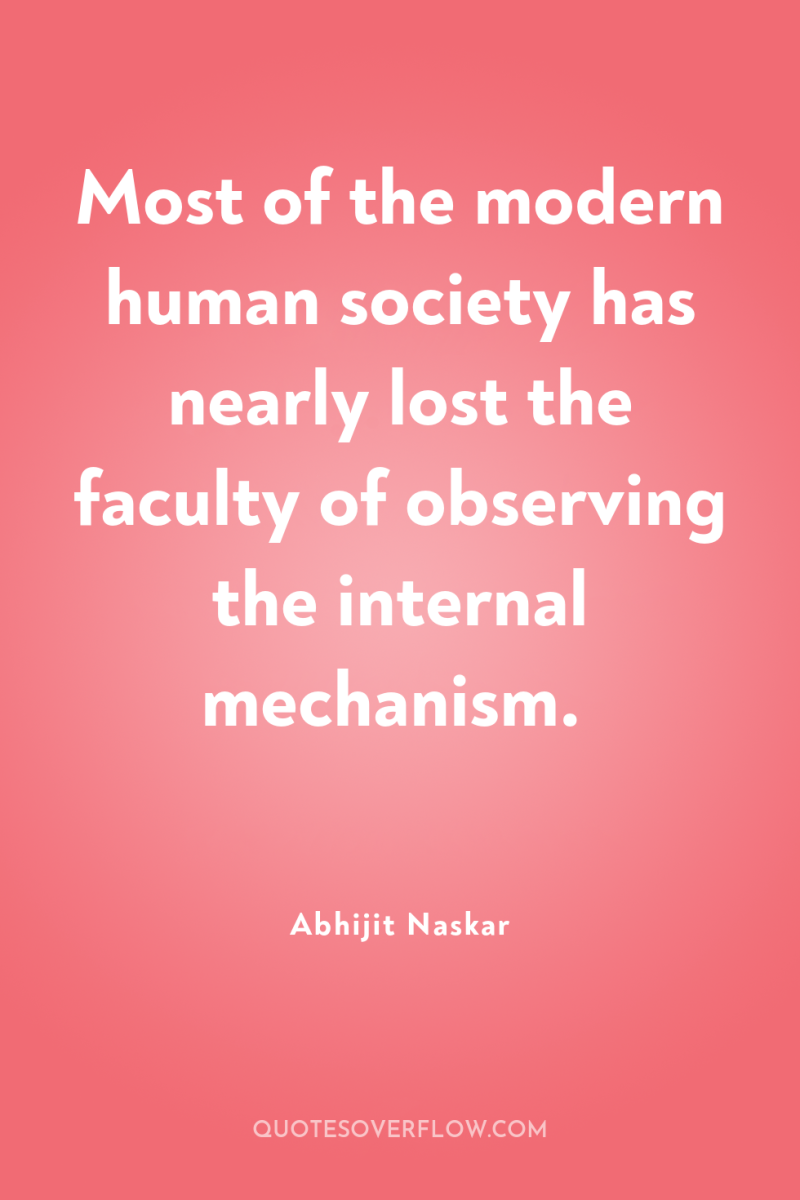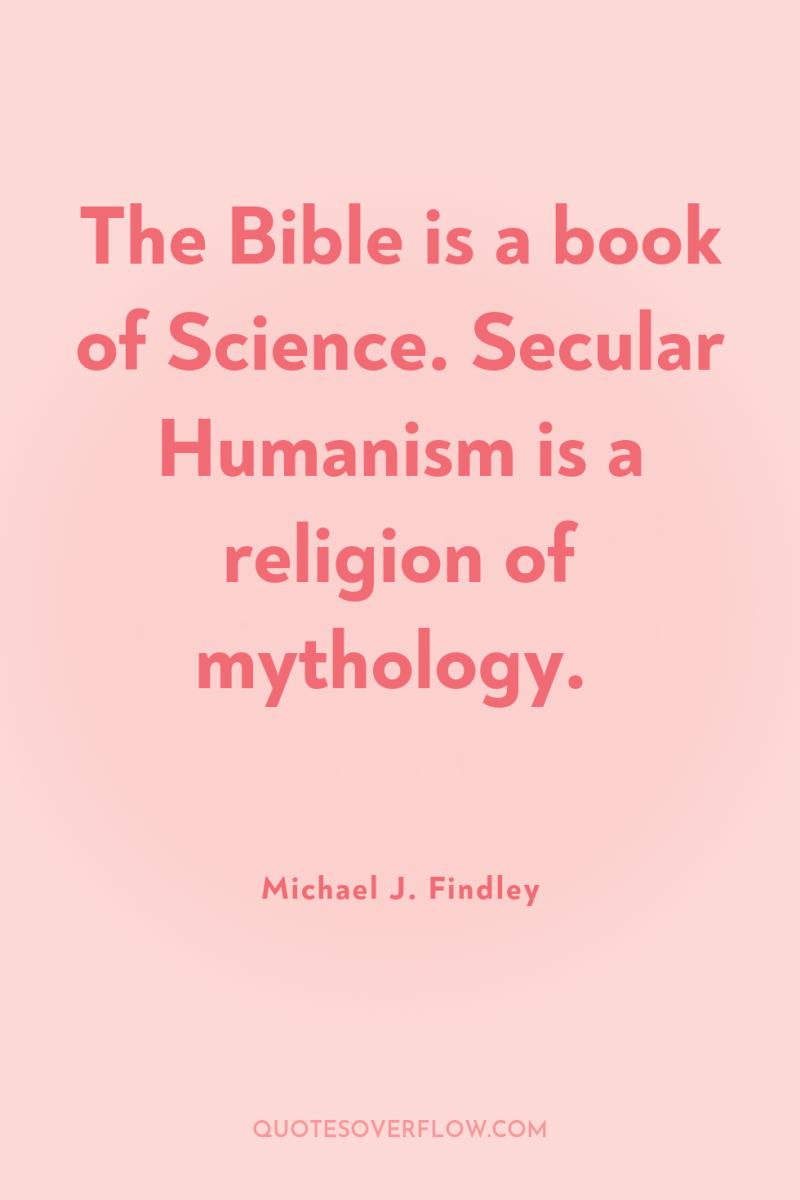1
As for the belief that humanity is mostly good, Secular humanism, when in that alignment, always presumes the existence of a higher power, or some god-like influence on man. Because it then becomes the belief that people are generally good and should be protected from the wiles of religion, as though this dark, vague and ignorant force once fell from the heavens, latched onto the purer hearts and minds of men and women, and, in all its forms, controlled and polluted the whole of human history. He says, 'When we defeat religion, humanity will be free.' But, if he were duly consistent, if he were really at all as secular as he claims, he might as well admit to what is actually an underlying brand of nihilistic cynicism: 'When we defeat humans, humanity will be free.Criss Jami

2
Most of the modern human society has nearly lost the faculty of observing the internal mechanism.Abhijit Naskar

3
The Bible is a book of Science. Secular Humanism is a religion of mythology.Michael J. Findley
4
You are modern humans of the civilized world. And modern humans rise beyond all laws and superstitions of the society. They help their fellow beings to rise from the ashes of ignorance, illusion and fear.Abhijit Naskar
5
The humanitarian philosophies that have been developed (sometimes under some religious banner and invariably in the face of religious opposition) are human inventions, as the name implies - and our species deserves the credit. I am a devout atheist - nothing else makes any sense to me and I must admit to being bewildered by those, who in the face of what appears so obvious, still believe in a mystical creator. However I can see that the promise of infinite immortality is a more palatable proposition than the absolute certainty of finite mortality which those of us who are subject to free thought (as opposed to free will) have to look forward to and many may not have the strength of character to accept it. Thus I am a supporter of Amnesty International, a humanist and an atheist. I believe in a secular, democratic society in which women and men have total equality, and individuals can pursue their lives as they wish, free of constraints - religious or otherwise. I feel that the difficult ethical and social problems which invariably arise must be solved, as best they can, by discussion and am opposed to the crude simplistic application of dogmatic rules invented in past millennia and ascribed to a plethora of mystical creators - or the latest invention; a single creator masquerading under a plethora of pseudonyms. Organisations which seek political influence by co-ordinated effort disturb me and thus I believe religious and related pressure groups which operate in this way are acting antidemocratically and should play no part in politics. I also have problems with those who preach racist and related ideologies which seem almost indistinguishable from nationalism, patriotism and religious conviction.Harry W. Kroto
6
The Western post- Christian civilization has picked up the Christ without His Cross. But a Christ without a sacrifice that reconciles the world to God is a cheap, colorless, itinerant preacher who deserves to be popular for His great Sermon on the Mount, but also merits unpopularity for what He said about His Divinity on the one hand, and divorce, judgment, and hell on the other. This sentimental Christ is patched together with a thousand commonplaces, sustained sometimes by academic etymologists who cannot see the Word for the letters, or distorted beyond personal recognition by a dogmatic principle that anything which is Divine must necessarily be a myth. Without His Cross, He becomes nothing more than a sultry precursor of democracy or a humanitarian who taught brotherhood without tears. .Fulton J. Sheen
7
The heart of the difference between cheap-grace doctrines of guilt-free existence and the Christian gospel is this: Modern chauvinism desperately avoids the message of guilt by treating it as a regrettable symptom. Christianity listens to the message of guilt by conscientious self-examination. Hedonism winks at sin. Christianity earnestly confesses sin. Secularism assumes it can extricate itself from gross misdeeds. Christianity looks to grace for divine forgiveness. Modern consciousness is its own fumbling attorney before the bar of conscience. Christianity rejoices that God himself has become our attorney. Modernity sees no reason to atone for or make reparation for wrongs. Christianity knows that unatoned sin brings on misery of conscience. Modern naturalism sees no need for God. Christianity celebrates God's willingness to suffer for our sins and redeem us from guilt.Thomas C. Oden
8
I noticed that religion gave some people a way to escape dealing with the world: “Things will be better when you die, ” the people of my grandma’s generation said as they worked themselves to death. “God wants you to forgive and love those who do you wrong, ” some people said to shake off the shame of being unable to respond to the abuse they endured. The holier-than-thou faction found comfort in believing, “The rest of y’all are lost because you don’t have a personal relationship with God–our God.” But art engages you in the world, not just the world around you but the big world, and not just the big world of Tokyo and Sydney and Johannesburg, but the bigger world of ideas and concepts and feelings of history and humanity.Wynton Marsalis